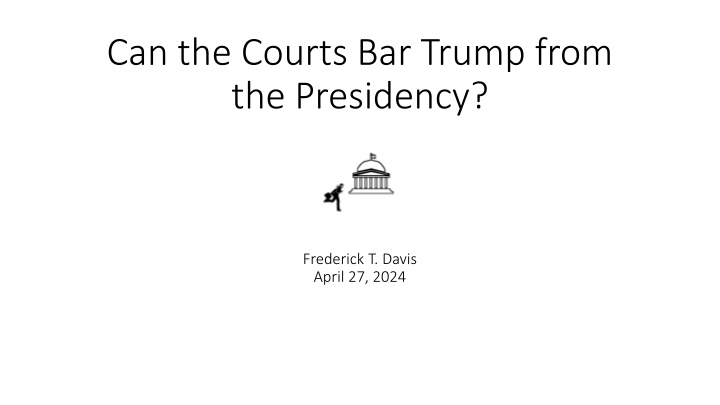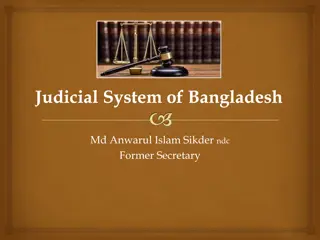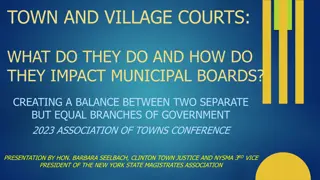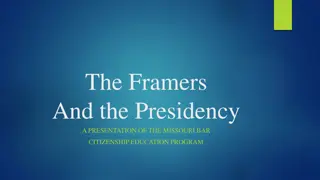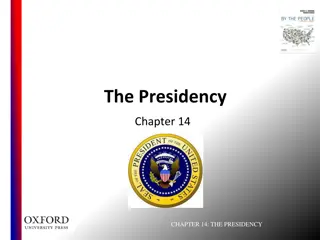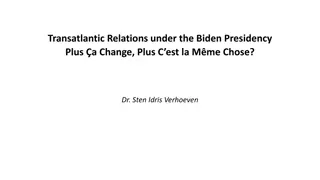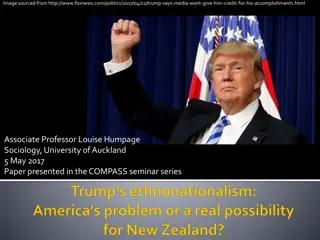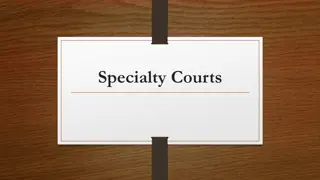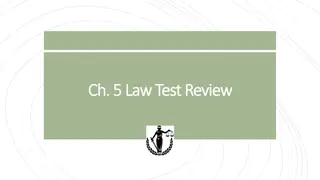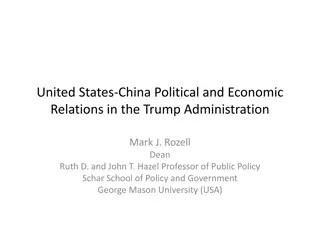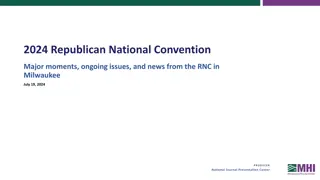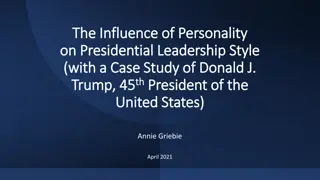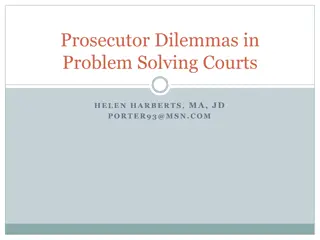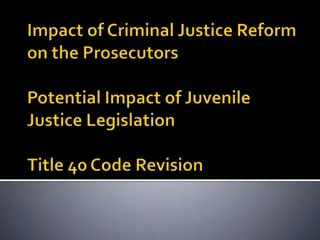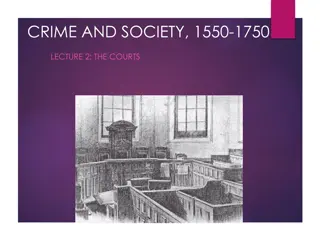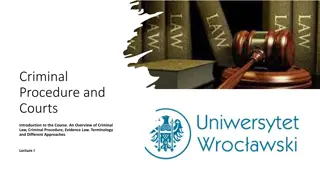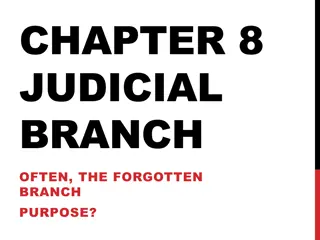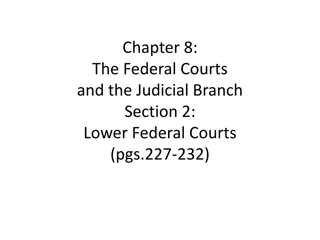Can the Courts Bar Trump from the Presidency? Understanding Constitutional Requirements
Constitutional requirements regarding the election and eligibility for the presidency in the United States are outlined, including the role of the Electoral College, voting procedures for electors, and the necessary qualifications for potential candidates. The document also addresses the question of whether criminal convictions can prevent an individual like Trump from serving as President, citing specific indictments faced by him in various states.
Download Presentation

Please find below an Image/Link to download the presentation.
The content on the website is provided AS IS for your information and personal use only. It may not be sold, licensed, or shared on other websites without obtaining consent from the author.If you encounter any issues during the download, it is possible that the publisher has removed the file from their server.
You are allowed to download the files provided on this website for personal or commercial use, subject to the condition that they are used lawfully. All files are the property of their respective owners.
The content on the website is provided AS IS for your information and personal use only. It may not be sold, licensed, or shared on other websites without obtaining consent from the author.
E N D
Presentation Transcript
Can the Courts Bar Trump from the Presidency? Frederick T. Davis April 27, 2024
Constitutional requirements: Election No direct election, rather election by the Electoral College Some federal control over the time of elections, but The places and manner of elections for Electors are left to the individual States to design and administer In a popular election held under State procedures, a citizen votes for a candidate, but in technical terms votes for an Elector committed to that candidate (There are 538 Electors: one for each Senator and Member of the House of Representatives) In most but not all States the vote is on an all or nothing basis: a candidate who wins 51% of the popular vote in a State gets 100% of the Electors for that State The Electors thus chosen by the popular vote in each State then meet to record their vote for President and Vice-President The outcome of the election in each State is then transmitted to the President of the Senate to be counted (this is what happened on January 6 2021)
Constitutional requirements: Eligibility Article 2 of the Constitution: No Person except a natural born Citizen, or a Citizen of the United States, at the time of the Adoption of this Constitution, shall be eligible to the Office of President; neither shall any Person be eligible to that Office who shall not have attained to the Age of thirty five Years, and been fourteen Years a Resident within the United States.
Question 1: Can a Criminal Conviction Block Trump from Serving as President? Trump faces four indictments: State courts: o New York: for falsifying business documents to hide hush money payments to porn stars o Georgia: for taking steps to shift the Georgia Elector votes from Biden to Trump Federal courts: o Florida: for keeping official/secret documents, and obstructing justice o Washington DC: for taking steps to keep Electors committed to Biden from having their votes counted
Question 1: Can a Criminal Conviction Block Trump from Serving as President? (cont d) A conviction (or even imprisonment) on any (or even all) of these charges would not bar election or service: Does not affect eligibility under Article 2 of the Constitution State court convictions can have no effect on a federal election A federal conviction: In each case the prosecutor might have chosen to prosecute under a statute that would render Trump ineligible if convicted, but chose not to
Question 1: Can a Criminal Conviction Block Trump from Serving as President? (cont d) In the Washington, D.C. case, Trump was NOT charged under 18 USC Section 2383 18 USC 2383 says that [w]hoever incites, sets on foot, assists, or engages in any rebellion or insurrection against the authority of the United States of the law thereof, or gives aid or comfort thereto, shall be fined under this title or imprisoned by more than ten years, or both; and shall be incapable of holding any office under the United States. Separately, in February 2021 if Trump had been convicted in the Senate after impeachment, the Senate could have barred him from eligibility, but the vote to convict lacked the necessary super-majority
Question 2: Can Trump Be Disqualified under the 14thAmendment Section 3 of the 14thAmendment provides: No person shall be a Senator or Representative in Congress, or elector of President and Vice-President, or hold any office, civil or military, under the United States, or under any State, who, having previously taken an oath, as a member of Congress, or as an officer of the United States, or as a member of any State legislature, or as an executive or judicial officer of any State, to support the Constitution of the United States, shall have engaged in insurrection or rebellion against the same, or given aid or comfort to the enemies thereof. But Congress may by a vote of two- thirds of each House, remove such disability.
Question 2: Can Trump Be Disqualified under the 14thAmendment (cont d) The Sweep and Force of Section Three University of Pennsylvania Law Review, Vol. 172, Forthcoming 126 Pages Posted: 14 Aug 2023 William Baude, University of Chicago - Law School Michael Stokes Paulsen, University of St. Thomas School of Law Abstract Section Three of the Fourteenth Amendment forbids holding office by former office holders who then participate in insurrection or rebellion. Because of a range of misperceptions and mistaken assumptions, Section Three s full legal consequences have not been appreciated or enforced. This article corrects those mistakes by setting forth the full sweep and force of Section Three.
Question 2: Can Trump Be Disqualified under the 14thAmendment (cont d) The core of their article: The events leading to and on January 6 were an insurrection as meant by the Amendment, and Trump engaged in it. The provision is self-executing : Trump simply IS ineligible, no less than if he were <35 or a non-citizen
Question 2: Can Trump Be Disqualified under the 14thAmendment (cont d) Among the (Many) Legal Issues: Did Trump engage in an insurrection ? Is Section 3 self-executing in the absence of legislation to enforce it? Is Trump a former officer ? Did Trump take an oath to support the Constitution ? Does Section 3 bar his being elected President (or just holding the office of the President)? Possible defense: First Amendment protected Trump s acts
Question 2: Can Trump Be Disqualified under the 14thAmendment (cont d) The not self-executing issue really has two parts: o Does the absence of legislation mean that the provision cannot be enforced at all? 1869 opinion by Chief Justice Chase said that Section 3 is unenforceable for this reason Baude/Paulsen provide good but not conclusive argument that he was wrong o In the absence of legislation, what procedures could be followed to enforce Section 3?
Question 2: Can Trump Be Disqualified under the 14thAmendment (cont d) What procedures might lead to disqualification? Baude/Paulsen are notably vague on this: We submit that all such [State] officials administrators, executives, legislatures possessing legal authority concerning such [election] matters likewise possess the authority (and duty) to interpret, apply, and enforce Section Three s disqualification in the course of exercising that legal authority. And once again: if such determinations are judicially reviewable under state law, the courts likewise possess the authority and duty to interpret, apply, and enforce Section Three. But the key point is that in their view any such procedures must be those of State actors
The Colorado Proceeding Several voters brought an action to disqualify Trump in Colorado State court After holding an evidentiary hearing, a trial judge wrote an opinion concluding that: o Colorado State election laws empowered her to determine whether Trump was eligible or disqualified to be on the ballot o Trump did engage in an insurrection within the meaning of Section 3 o Trump s acts were not protected by the First Amendment o BUT Section 3 does not apply to the President because he was not an officer within the meaning of the Section. Thus, case dismissed. o Noted in a footnote that her conclusion was based on purely legal issues and might be appealed
The Colorado Proceeding (contd) On December 19, the Colorado Supreme Court reversed (4-3 decision) o Agreed that State election laws permitted a judicial review of Trump s eligibility o Agreed that the record showed by clear and convincing evidence that Trump had engaged in an insurrection o Agreed that his acts were not protected by the First Amendment o Held that Section 3 does apply to Presidents, and thus to Trump o Ordered that Trump be barred from the ballot in Colorado (but stayed pending review by the Supreme Court)
Possible Outcomes in the Supreme Court A definitive outcome in favor of Trump 1. o That Section 3 does not apply to Presidents, or o That Section 3 is not self-executing and is thus unenforceable, or o That the facts found by the Trial Court did not constitute an insurrection, or o That the Colorado election law procedures (and evidentiary rulings) did not sufficiently protect Trump (or voters); or o That Trump s acts were protected by the First Amendment
Possible Outcomes in the Supreme Court (cont d) A non-definitive outcome in favor of Trump 2. o That Section 3 does not disqualify a candidate from election but only from holding the office of President, thus Section 3 can only be enforced when he is elected, in order to determine whether he can hold the office o (On the grounds that otherwise the last sentence of Section 3, allowing Congressional override, could not be given effect). o Thus permitting a new challenge if he is elected.
Possible Outcomes in the Supreme Court (cont d) 3. An affirmance of the Colorado Supreme Court o Colorado s interpretation of its own election laws cannot be reviewed by the Supreme Court of the United States o The Colorado Supreme Court s interpretation of Section 3 was correct o The Colorado proceedings provided sufficient procedural fairness to Trump and voters o The evidence heard at trial in November 2023 was sufficient to support the State courts conclusion that Trump engaged in an insurrection
Result of an Affirmance There was no legislative or Constitutional basis for the Supreme Court to make a judgment that is binding on the 49 other States, such as We find that Trump did engage in insurrection under Section 3 and is disqualified to hold the office of the President. Normally when the Court reviews a State court judgment, it is restricted to finding whether the judgment violated the U.S. Constitution or a federal statute (or not) in that specific case and based on its record A judgment affirming the Colorado Supreme Court might thus authorize other States to follow similar procedures under their respective State election laws, but would not compel them to do so. In particular, the courts in another State might hold a new evidentiary hearing and conclude that Trump did NOT engage in insurrection Or alternatively, that its State election laws provide no basis to disqualify Trump.
The Supreme Courts Decision Unanimous: the Colorado judgment was wrong, and is vacated. Majority (5 Justices): We conclude that States may disqualify persons holding or attempting to hold state office. But States have no power under the Constitution to enforce Section 3 with respect to federal offices, especially the Presidency. Responsibility for enforcing Section 3 against federal officeholders and candidates rests with Congress and not the States. Thus: Section 3 can only be applied against a Presidential candidate if Congress adopts tailored legislation Three liberal Justices: Agree with the result: Allowing Colorado to [disqualify] would, we agree, create a chaotic state-by-state patchwork, at odds with our Nation s federalism principles. But disagree that tailored federal legislation is the ONLY way to enforce Section 3. Would leave open the (vague) possibility of enforcement under general federal statutes requiring the government to comply with the law. Justice Barrett: Very short opinion, essentially agrees with the three Liberals But adds that there is no need for their strident language Concludes: All nine Justices agree on the outcome of this case. That is the message Americans should take home.
Status: New York case Theory: That Trump paid large hush money payments to porn stars to keep their tales of sexual adventures with him from becoming public near the election That he falsified business records to hide the fact that the payments were made for that purpose Normally a misdemeanor under State law, the charge would be a felony if proved that the falsification was to hide or promote a separate crime Prosecutor claims that the falsification was to hide State and Federal campaign violations, and possibly tax violations Status: Jury selected as of April 19 Trial underway Could last several weeks Comments: Trump s antics in court risk his being held in contempt Very strong judge
Status: Georgia case Theory: That Trump and large number of associates violated Georgia RICO statutes by systematically violating laws relating to elections Status: A few of the co-defendants have pleaded guilty, with very minor punishment No trial date set Comments: The standing of the (elected) Prosecutor was undercut by claims that she abused her office in her relations with a specially- appointed staff member Judge permitted her to stay on the case, but with caustic comments about her credibility That issue is still being appealed Multiple defendants risk a complicated trial
Status: Federal documents case Theory: That Trump systematically selected sensitive documents covered by federal secrecy statutes to take with him after he left the Presidency That he showed some of them to private parties That he encouraged others to lie about, and hide, the documents causing obstruction of justice Status: No trial date set Comments: The trial judge appears weak, has made some odd rulings Complicated issues relating to how to use confidential documents and information as evidence in a public trial Not directly relevant, but distracting that President Biden was found to have kept confidential documents in his home from his time as Vice-President; a Special Counsel announced that Biden would not be prosecuted, in part because of his perceived memory issues.
Status: Federal January 6 case Theory: That Trump and unnamed (but obviously identifiable) others conspired to Defraud the United States Obstruct justice Deprive others of their right to vote NOT charged with obstruction or seditious conspiracy like many other January 6 actors Status: No trial date set Comments: Strong judge Trial being held up for, could be limited by, two pending Supreme Court rulings Is Trump immune from prosecution? (Highly unlikely that Trump will prevail on this, but the argument on Thursday suggests that the issue will delay a trial beyond the election.) Does one of the obstruction statutes apply to the insurrection that took place on January 6? Oral argument indicated uncertain outcome on this.
